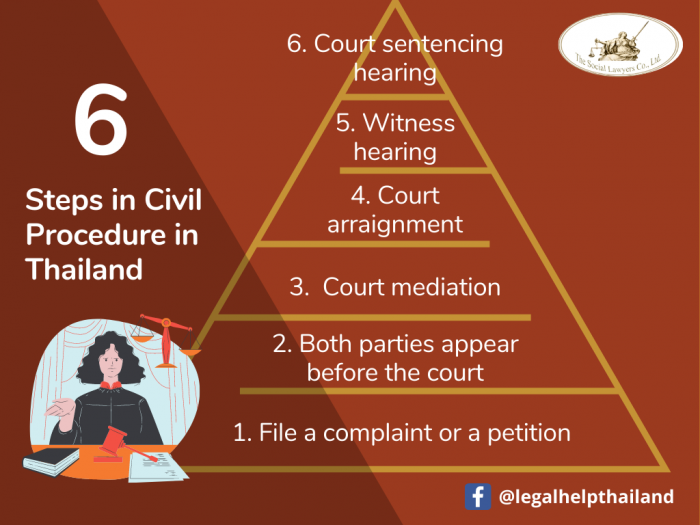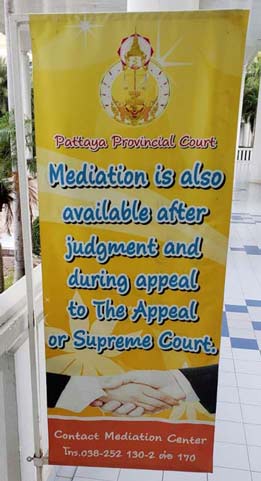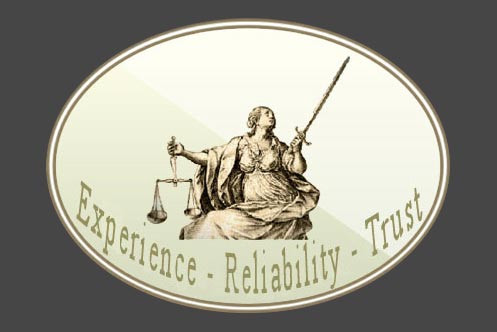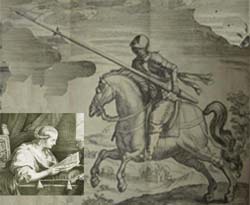Our law firm also specializes in
Civil Cases
Litigations
and
Extra Juditial Agreements
(Mediator)
Knowing the Law is your first protection
We will analyze the case and suggest you the best strategy to achieve positive results as quickly as possible. We always put our client’s interest before any other considerations. When circumstances suggest, we try to favour, extra-judicial agreements (A full article on this crucial subject will be soon published here) rather than a lengthy court battle.
The research of an agreement is indeed always favoured by the Thai Courts, which usually, before proceeding to the trial, call the parts and try to find a “friendly” solution. Such kind of agreements once ratified, have the value of a final sentence and will be enforced by law.
Our law firm has a pervasive experience in the field and can effectively help you to get the best possible results saving a massive quantity of time, expenses and stress.
Furthermore, in avoidance of any possible misunderstandings, our Pattaya lawyers always use the professional help and assistance of an experienced, reliable and trustful court legal interpreter.
(How to get compensation in a criminal case)
Victimes et bourreaux
Damage-compensation for the victims of crimes in Thailand.
In most western countries, the victim of a crime has the right to be compensated for the damage "bringing a civil action in a criminal case".
The judge, at the end of a criminal case, will determine the amount of a "provisional compensation" obliging the recognized-author of a crime to pay the victim for the damages he caused even before a civil court shall further determine the full extent of the due indemnity.
With this concept in mind, most foreigners living in Thailand, especially when coming from continental Europe, wrongly expect to obtain a similar treatment thinking that a sentence of guilt, pronounced against the perpetrator of a criminal act, would "automatically" assign them some sort of compensation. I personally assisted to scenes of dismal bewilderment when the victims find out that no compensation has been ordered by the criminal court judge. The typical incomprehensions due to language barriers between lawyers and clients do not help either. So, let's clear once and for all this essential point:
The Thai justice system keeps the two branches of the law, "civil" and "criminal" and the respective procedures, totally distinguished and separated.
While a criminal action and the consequent criminal trial will merely establish if the accused-defendant is, in front of justuice, innocent or guilty, only a civil trial will establish and enforce the obligation to pay a compensation to the victims. In other words, technically, in Thailand, to obtain both, justice and compensation for the damages caused by a crime, you need to file two separate legal suites: a civil one and criminal one.
But is this really true?
If so, why should we, apart to fulfill our sense of justice, prosecute somebody in a criminal case if in no way such an action will entail a compensation?
First of all a criminal process is usually faster then a civil one. Secondly, and most importantly, compensating the victim of a crime will entail a more lenient sentence or, except for some serious cases where the action is promoted by the "Ayagan", (the public prosecutor), even the closure of the case.
Consequently if you are the victim of a crime such as fraud, robbery, embezzlement, libel, defamation, careless road accident, battery, forgery, larceny, and so on, prosecuting the doer in a criminal case could lead to a much quicker and satisfactory compensation. The guilty-defendant, when accused of a crime will, in most cases, be forced to offer an appropriate compensation to avoid being sentenced to jail time.
This "spirit" literally pervades the whole Thai legal system: the research of a judicial agreement that can be enforced by the judge.
In confirmation of this concept, the Thai Justice System has established a special, appreciable "institution", the so called "Center for Peace and Reconciliation" (from which anybody can get specific information or file a complaint calling the number 038 252 130 ext. 170 172) Who's aim is to "manage criminal cases by promoting and encouraging the parties to settle the dispute by reconciliation and peaceful method...raise awareness and social responsibility recognition of their action for the parties...focusing and redressing the harm done to the victims, holding offenders accountable for their actions..."
Even though usually the Center for Peace and Reconciliation will act at the beginning of the legal procedure, the parties can ask it's intervention at any stage of the criminal justice process with a simple motion.
The court will therefore appoint as "Mediator" a legal or lay qualified person who will help facilitate their negotiation to achieve an amicable solution.
Should the parties find an agreement, the Court will enforce it by law, should they not...the odyssey of long, expensive and stressful criminal and civil trials will begin.
An agreement or even a compromise is often better then a full victory.
(Thai Criminal Law 3rd part)
Victimes et bourreaux
Damage-compensation for the victims of crimes in Thailand.
In France, as in most western countries, the victim of a crime has the right to be compensated for the damage "bringing a civil action in a criminal case" (se constituer partie civile).
The judge, at the end of a criminal case, will determine the amount of a "provisional compensation" obliging the recognized-author of a crime to pay the victim for the damages he caused even before a civil court shall further determine the full extent of the due indemnity (indemnité).
With this concept in mind, most foreigners living in Thailand, especially when coming from continental Europe, wrongly expect to obtain a similar treatment thinking that a sentence of guilt, pronounced against the perpetrator of a criminal act, would "automatically" assign them some sort of compensation. I personally assisted to scenes of dismal bewilderment when the victims find out that no compensation has been ordered by the criminal court judge. The typical incomprehensions due to language barriers between lawyers and clients do not help either. So, let's clear once and for all this essential point:
The Thai justice system keeps the two branches of the law, "civil" and "criminal" and the respective procedures, totally distinguished and separated.
While a criminal action and the consequent criminal trial will merely establish if the accused-defendant is, in front of justuice, innocent or guilty, only a civil trial will establish and enforce the obligation to pay a compensation to the victims. In other words, technically, in Thailand, to obtain both, justice and compensation for the damages caused by a crime, you need to file two separate legal suites, a civil one and criminal one.
But is this really true?
If so, why should we, apart to fulfill our sense of justice, prosecute somebody in a criminal case if in no way such an action will entail a compensation?
First of all a criminal process is usually faster then a civil one. Secondly, and most importantly, compensating the victim of a crime will entail a more lenient sentence or, except for some serious cases where the action is promoted by the "Ayagan", (the public prosecutor), even the closure of the case.
Consequently if you are the victim of a crime such as fraud, robbery, embezzlement, libel, defamation, careless road accident, battery, forgery, larceny, and so on, prosecuting the doer in a criminal case could lead to a much quicker and satisfactory compensation. The guilty-defendant, when accused of a crime will, in most cases, be forced to offer an appropriate compensation to avoid being sentenced to jail time.
This "spirit" literally pervades the whole Thai legal system: the research of a judicial agreement that can be enforced by the judge.
In confirmation of this basic concept, the Thai Justice System has established a special, appreciable "institution", the so called "Center for Peace and Reconciliation" (from which anybody can get specific information or file a complaint calling the number 038 252 130 ext. 170 172) Who's aim is to "manage criminal cases by promoting and encouraging the parties to settle the dispute by reconciliation and peaceful method...raise awareness and social responsibility recognition of their action for the parties...focusing and redressing the harm done to the victims, holding offenders accountable for their actions..."
Even though usually the Center for Peace and Reconciliation will act at the beginning of the legal procedure, the parties can ask it's intervention at any stage of the criminal justice process with a simple motion.
The court will therefore appoint as "Mediator" a legal or lay qualified person who will help facilitate their negotiation to achieve an amicable solution.
Should the parties find an agreement, the Court will enforce it by law, should they not...the odyssey of long, expensive and stressful criminal and
LITIGATION The Mediation in the Thai Law
The Mediation in the Thai Law

The Importance of Wisdom and Tolerance in the Thai Law System and in the Thai Society
Today we will examine one of fundaments of the legislation system at the light of a millenary culture as it is the Culture of the country where we leave, Thailand.
Never, as in this case, the term "culture" must be intended and understood in its widest sense of the meaning, which certainly includes traditions, history, costumes and Buddhist religion.
Before starting our brief voyage to try to unveil some mysteries I would like to emphasize as, even though the Mediation Process produces the most effective results in case of civil disputes or in case of compoundable offences, it can deeply effect the result of any sentences even the most harsh and severe.
Furthermore it is interesting to observe that, even though the word "Mediation" has little to do with "Confession", it is undeniable how in Thailand the concepts are the "children of the same parents" and we will soon understand why.
If you have the chance to visit a Thai court of Justice, you might find a publication offered to the public which I would urge you to read very thoroughly for it not only contains the fundaments of the institute of the Mediation, it reflects the deep soul of the entire Thai society.
In its preamble we read:
" What is the importance of mediation? It is considered so important that the state invested considerable human and financial resources and all Thai Court has its own dedicated Mediation Center and several well trained "mediators" including eminent magistrates.
"The Court of Justice is in charge of the administration of justice for the people. Its primary goal is to have disputes settled with convenience, speediness and fairness."
In addition to having disputes settled by means of hearing and rendering judgment, mediation is a method to resolve disputes which is commonly adopted by courts of many countries. Mediation is a dispute resolution mechanism that can enable a convenient, speedy and efficient settlement.
Well I don't totally agree on this for I think that Thailand is by far an absolute leader on in the field, second to no one. But lets reach the real gist of the institute of Mediation as explained in the brochure:
In mediation, the disputing parties may achieve a mutually satisfactory settlement in which there is no loser or winner from the outcome.
In mediation, both parties can emerge as the winners with a win-win solution that can preserve their long-term relationship.
In other words Mediation is not a way to win and to neglect the other part reasons in any field of the law, but a way to leave in peace (more than two hundred years without wars or involvement in any war!) to the point that, as brilliantly stated at the end of the page we read:
Last but by no means the least(!), settlement of dispute by mediation also can lead to a more peaceful and harmonious society, reduce the number of cases going through the trial process, and provide a chance for people participation in the dispute settlement process.
That is the point that resume the gist of Thai philosophy of life: live and let live, try understanding each other, avoiding conflicts and, always, pay respect to the poor, the elderly and to the institutions.
Finally we read:
Mediation is a means of dispute resolution facilitated by a neutral third person who assists the parties in finding mutually acceptable solutions. If the parties reach an amicable solution, they may enter into a binding and enforceable compromise agreement.
In other words an amicable solution between the parties during the Mediation will be bestowed by the court and have the force of a final sentence.
Before closing this introduction to one of the most important aspect of the Thai Legal System we would like to underline as an unreasonable, stubborn behavior during the mediation phase will not help you case at all in front of the court and during future hearings and finally emphasize how the world mediation doesn't have to be confused with the arbitration which is a total different concept.
In fact while the Arbitrator will actually decide, on the contrary the Mediator will help and induce the parties to find a mutual agreement.




